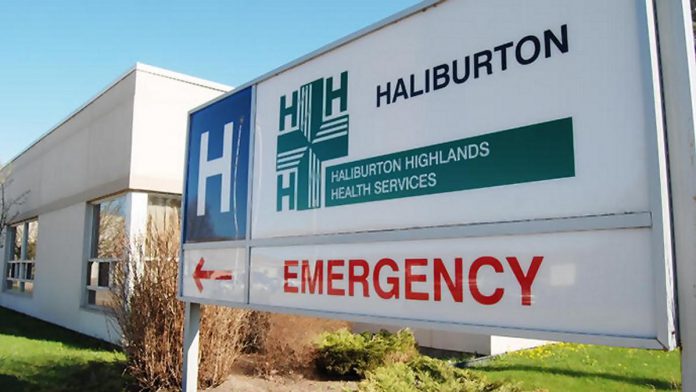
As part of its “master planning” initiative for the future of healthcare in Haliburton County, Haliburton Highlands Health Services (HHHS) wants to hear from residents in the rural Kawarthas communities it serves.
With the population served by HHHS projected to grow by 22 per cent over the next 20 years, and the number of residents over 80 years of age increasing by 59 per cent over the next decade, HHHS says its master planning initiative “will ensure our healthcare system evolves to meet these demands.”
HHHS is hosting a series of “Future of Care Forums” during the initial planning process, with three upcoming sessions that call on members of the community to share their thoughts and ideas.
The first forum is on Wednesday (February 19). Called the “Future of Care Forum #1: What’s on the Go at HHHS,” the session will provided residents with the latest updates on HHHS initiatives, recent achievements, and future projects.
The session takes place from 6 to 7:30 p.m. and can be attended virtually or in person in the auditorium at the HHHS Minden site at 6 McPherson St.
There are two more sessions in March: one on Wednesday, March 5 (“Future of Care Forum #2: The Future of LTC”), and the other on Wednesday, March 26 (“Future of Care Forum #3: The Future of Acute Care”). Both sessions takes place from 6 to 8 p.m. and can be attended virtually or in person at the Minden site.
Lauren Ernst, HHHS communications and employee experience lead, shared a few thoughts with kawarthaNOW about the importance of the undertaking for the hospital.
“This master planning effort represents a unique and much-needed opportunity in the history of HHHS to rethink and revitalize our health care infrastructure,” Ernst said. “By addressing these critical issues, we can build a health care system that is robust and capable of meeting the needs of our community both now and into the future.”
She said a key component of the endeavour is community participation in the Future of Care Forums.
“These events, hosted both in person and virtually, will provide an opportunity for residents to learn about early plans, ask questions, and share their feedback to help shape the vision for healthcare in the County of Haliburton,” Ernst noted.
HHHS said it plans to keep residents informed of the master planning initiative and its progress through local media, community events, and regular updates, with the intent to “build momentum, foster transparency, and engage the local community.”
Hospital master planning is a long-term process that assesses the adequacy and functionality of facilities, ensuring spaces meet the needs of the community both today and tomorrow, HHHS noted on its website. This involves planning for mid-term (five to 10 years) and long-term (15, 20, and 30 years) needs.
“Since we are still in the initial stages of the master planning process, the plans and ideas are conceptual and will evolve as we continue to collaborate with the community, government, and our design team,” HHHS noted.
In the mid-term over the next five to 10 years, HHHS envisions the following enhancements for its hospital master plan:
- Provide specialty ambulatory care clinics such as internal medicine and gynecology clinics.
- Expand Minden Health Hub services including primary care services for unattached patients and better access to urgent care.
- Expand to include MRI services, better supporting safe emergency services, urgent care, and ambulatory care while bringing care closer to home.
- Expand the inpatient unit at the hospital from 15 beds to 24 to 30 beds. Some of these beds would be chronic continuing care and rehab beds to enable patients to receive the right treatment and care to recover close to home before returning home safely, reducing return trips to the hospital or the emergency department.
- Introduce a new inpatient “reactivation care model” for seniors within the inpatient bed complement with physiotherapy and occupational therapy.
- Expand the size of the hospital emergency department into the existing inpatient unit with dedicated staff spaces, procedure rooms to eliminate hallway medicine, and purpose-built airborne isolation rooms to support seasonal volume influx and to keep everyone safe.
HHHS is also in early discussions for other changes to the healthcare system over the next 15 to 30 years, and is also exploring options to increase its long-term care capacity.
For more information on the master planning process, and to register for the three Future of Care Forums, visit www.hhhs.ca/master-planning.


























